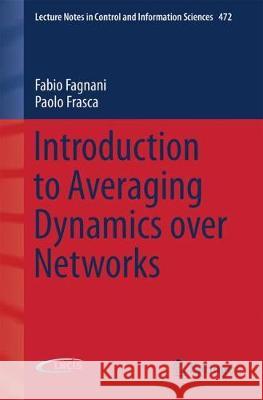Introduction to Averaging Dynamics Over Networks » książka



Introduction to Averaging Dynamics Over Networks
ISBN-13: 9783319680217 / Angielski / Twarda / 2017 / 135 str.
Introduction to Averaging Dynamics Over Networks
ISBN-13: 9783319680217 / Angielski / Twarda / 2017 / 135 str.
(netto: 421,70 VAT: 5%)
Najniższa cena z 30 dni: 424,07
ok. 22 dni roboczych.
Darmowa dostawa!
This book deals with averaging dynamics, a paradigmatic example of network based dynamics in multi-agent systems.
"This book gives a nice, conscientious introduction to the theory of averaging dynamics over networks. ... The book is essentially self-contained. In particular, it does not assume any knowledge of Perron-Frobenius theory, or Markov chain convergence. Every chapter of the book is complemented by numerous exercises and bibliographical notes." ( Jirì Cerný, Mathematical Reviews, February, 2019)
Graph Theory.- Averaging in Time-Invariant Networks.- Averaging in Time-Varying Networks.- Performance and Robustness of Averaging Algorithms.- Averaging with Exogenous Inputs and Electrical Networks.- Index.
Fabio Fagnani got his Laurea degree in Mathematics from University of Pisa and from Scuola Normale Superiore of Pisa in 1986. He got the PhD in Mathematics from University of Groningen nel 1991. He has been Assistant professor of Mathematical Analysis at the Scuola Normale Superiore during 1991-1998 and in 1997 he has been visiting professor at MIT. Since 1998 he is with the Politecnico of Torino where he is currently (since 2002) full professor of Mathematical Analysis. He has acted as coordinator of the PhD program Mathematics for Engineering Sciences of Politecnico di Torino in the period 2006-2012. Since June 2012 he is the head of the Department of Mathematical Sciences'G. L. Lagrange' of Politecnico di Torino. His current research topics are on cooperative algorithms and dynamical systems over graphs, inferential distributed algorithms, and opinion dynamics. He has published over 50 refereed papers on international journals, he has delivered invited conferences in many international workshops and conferences and in many universities (including MIT, Yale, IMA, EPFL, UCSB, UCSD, CWI, University of Groningen, University of Kyoto). He is Associate Editor of IEEE Transactions on Network Systems and of the IEEE Transactions on Network Science and Engineering. He is member of the international program committee for the IFAC events NECSYS.
This book deals with averaging dynamics, a paradigmatic example of network based dynamics in multi-agent systems. The book presents all the fundamental results on linear averaging dynamics, proposing a unified and updated viewpoint of many models and convergence results scattered in the literature.
Starting from the classical evolution of the powers of a fixed stochastic matrix, the text then considers more general evolutions of products of a sequence of stochastic matrices, either deterministic or randomized. The theory needed for a full understanding of the models is constructed without assuming any knowledge of Markov chains or Perron–Frobenius theory. Jointly with their analysis of the convergence of averaging dynamics, theauthors derive the properties of stochastic matrices. These properties are related to the topological structure of the associated graph, which, in the book’s perspective, represents the communication between agents. Special attention is paid to how these properties scale as the network grows in size.
Finally, the understanding of stochastic matrices is applied to the study of other problems in multi-agent coordination: averaging with stubborn agents and estimation from relative measurements. The dynamics described in the book find application in the study of opinion dynamics in social networks, of information fusion in sensor networks, and of the collective motion of animal groups and teams of unmanned vehicles. Introduction to Averaging Dynamics over Networks will be of material interest to researchers in systems and control studying coordinated or distributed control, networked systems or multiagent systems and to graduate students pursuing courses in these areas.
1997-2026 DolnySlask.com Agencja Internetowa
KrainaKsiazek.PL - Księgarnia Internetowa









